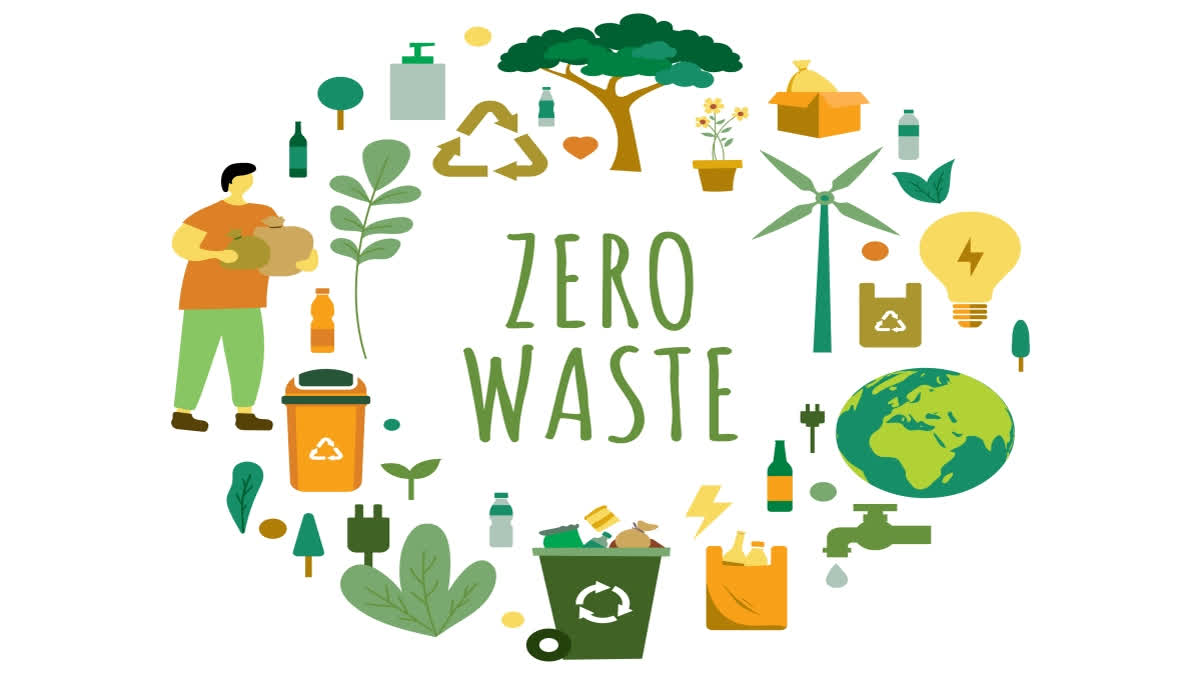Hyderabad: International Day of Zero Waste, observed on March 30 every year across the globe, serves as a reminder of the need to encourage sustainable patterns of consumption and production in addition to strengthening waste management on a worldwide scale.
Stats on Waste Management
Every year, humanity produces between 2.1 and 2.3 billion tonnes of municipal solid waste across the globe. About 2.7 billion people do not have waste collection services, and 2 billion of them live in rural areas. Waste pollution is a major risk to human health, growth and prosperity, and accelerates the three most pressing planetary crises of our time: climate change, biodiversity loss and pollution.
Without action, annual municipal solid waste generation worldwide is expected to rise to 3.8 billion tonnes in 2050. The United Nations (UN) reports that only 55 per cent of 2.24 trillion tonnes of municipal solid trash produced each year are disposed of in controlled facilities. It is also estimated that 931 billion tons of food is wasted or lost annually and that up to 14 trillion tons of plastic trash ends up in aquatic habitats.
History
The International Day of Zero Waste was marked on March 30, 2022, for the first time, according to a resolution passed by the United Nations General Assembly (UNGA) during its 77th session on December 14, 2022. The resolution was proposed by Turkey, and it was sponsored by 105 other nations. The resolution 'End plastic pollution: towards an internationally legally binding instrument' was one of several waste-related resolutions that were accepted by the UN Environment Assembly on March 2, 2022.
Significance
Encouraging zero-waste efforts on this worldwide day can contribute to the advancement of all the aims and goals found in the 2030 Agenda for Sustainable Development, including Goals 11 and 12. All types of waste are addressed by these objectives, including food loss and waste, electronic waste, and resource extraction.
Zero-waste programs can reduce and prevent waste as well as promote good waste management. This helps to preserve biodiversity, lessen the effects of climate change, reduce pollution, increase food security, and improve human health.
United Nations Secretary-General's message for 2024
"Our planet is drowning under a torrent of trash. Every year, humanity produces more than two billion tonnes of municipal solid waste. Rotting food, plastic bottles, chemical-laced electronics and much more is tossed away without regard for our water, land and air. As trash decays, it spews planet-warming greenhouse gases into our atmosphere, poisons our water and soil, and inflicts illness, disease and even death among people around the world.
Overconsumption is killing us. Humanity needs an intervention. Since last year, the Advisory Board on Zero Waste has been bringing partners together around this critical issue and what needs to be done to make zero waste a reality.
Businesses must rethink their products to minimise wasteful packaging and maximise longevity and lifecycle. Consumers must think twice about the goods and products they purchase, and recycle or reuse wherever possible. Governments at all levels must build circular economies that address resource depletion and management, and invest in modern waste-management programmes anchored in reuse, remanufacturing, recovery and waste prevention.
And the global community must stand as one and work towards achieving a legally binding treaty to end plastic pollution. On this Zero Waste Day, let's pledge to end the destructive cycle of waste, once and for all."
Waste Management in India
The Union Ministry for Environment, Forests and Climate Change (UMCD) is responsible for waste management in India. India's waste management regulations are predicated on the concepts of "polluter pays," "sustainable development," and "precaution."
According to TERI (The Energy and Resources Institute), every year India produces 62 million tonnes of garbage. 70 per cent of this waste is collected, 12 per cent is treated, and 31 per cent is disposed of in landfill. India generates 1.3 billion tonnes of garbage every year, which is one-third of the world's total.
Due to the large population of India, waste management in the country is extremely challenging. India needs to develop a recycling sector as only 5 per cent of the recycled material is being utilised at present. The main challenge in waste management in India lies in the lack of waste collection infrastructure and the lack of effective waste sorting and recycling mechanisms. Due to these flaws, valuable waste goes to landfills instead of being recycled. Solutions to these issues are necessary to protect the environment and ensure a sustainable future.
